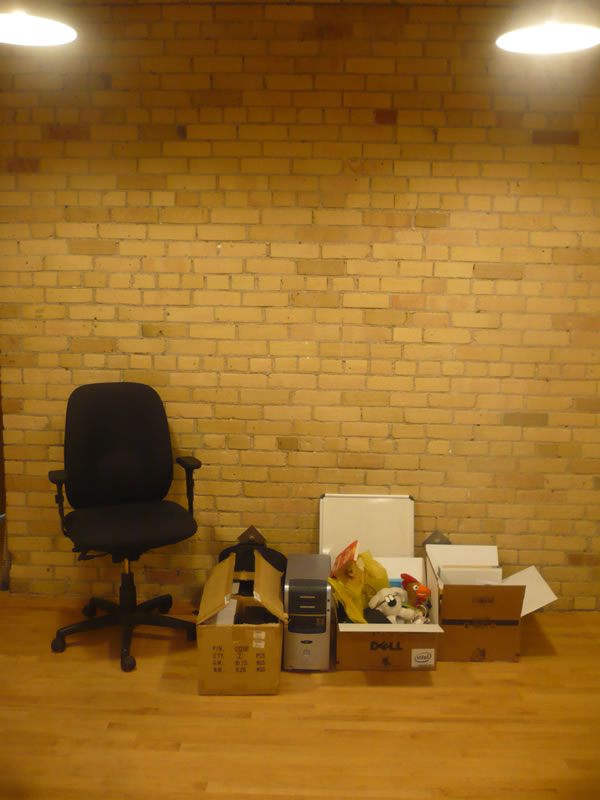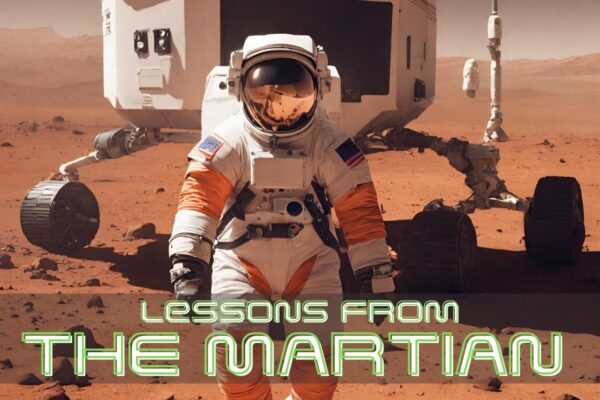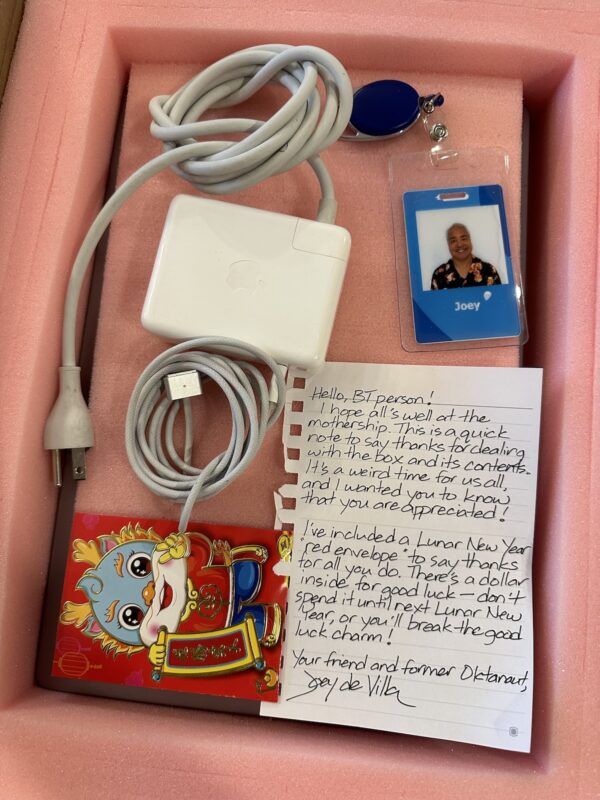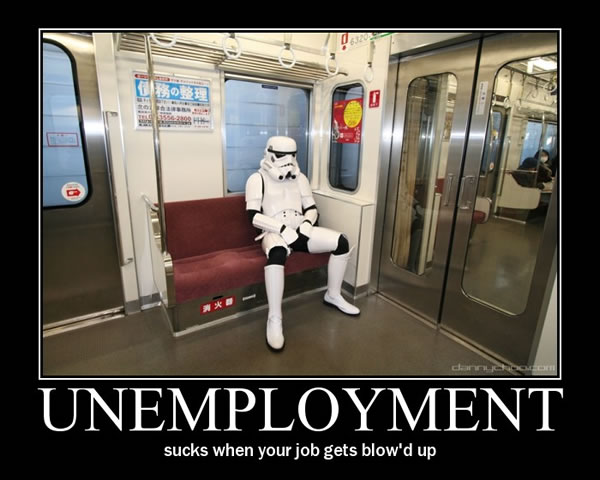I’m in Austin this week to deliver a talk at the Civo Navigate North America conference — so posting might be a little light this week. But here’s part 12 of the “Laid Off in 2024” series!
Lessons from The Martian
If you like sci-fi and are looking for inspiration as you make your way through the process of finding your next gig after being laid off, I recommend the audiobook version of The Martian, the book by Andy Weir that became the film of the same name starring Matt Damon.

While the film gave us STEM majors a memorable line that we’ll quote forever — “I’m gonna have to science the shit out of this” — the book tells a deeper story of perseverance, problem-solving, and perspicacity that is nothing short of inspiring.
I’m not exaggerating about the “inspiring” bit either. Whenever I’m working on a tough problem and I can’t figure out a solution, I put the audiobook version of The Martian on and put it on in the background. Listening to how stranded Mars astronaut Mark Watney assess the situation he’s in and uses his knowledge and the materials on hand to survive for 531 sols (those are Martian days, the equivalent of 546 days on Earth) has somehow helped me to:
- Relearn enough JavaScript and learn enough React to build a little web application that assembled a report for a telecom cost-optimization review, which a major tech vendor sold as part of their suite of services.
- Build the Python script that generates the weekly list of Tampa Bay tech, entrepreneur, and nerd events. It’s no simple assignment, as it must counter Meetup.com’s anti-scraping countermeasures.
- Write Augmented Reality in Android with Google’s Face API, my first Android programming article for RayWenderlich.com (now Kodeco), despite not ever having built an Android app or used Google’s API for detecting and tracking facial features.
- Pass my “audition” for Auth0 (now owned by Okta), where I had to write an application using tech I’d never used before (Auth0 and Spring Boot) and an article about that application.
If you find yourself feeling stuck, read The Martian or give the audiobook version a listen! As a treat, here’s the audiobook version, as uploaded to YouTube by a soul who doesn’t fear the copyright cops:
Peter Wheeler’s take on nondisparagement clauses

I know Peter Wheeler from my time at Auth0/Okta, where we met through initiatives where Auth0 would help out nonprofit organizations. He’s a sweet, solid guy, and he’s so willing to help out that if I had to assemble a crack team of a dozen people to save the world, he’d be one of the first people I’d call.
Peter gave me the idea to include something nice for the team that would have to deal with the company laptop when I shipped it back to them. That team also experienced, and they probably were feeling disheartened by the layoffs and having to process the laid-off people’s gear. I tell the whole story in an earlier post, The Box Came Back the Very Next Day.

In response to another post of mine, The Dreaded Non-Disparagement Clause, Peter posted a response on LinkedIn which bears repeating here:
The reality is – if you’ve got the time and energy to be talking about anything, it should be about what’s next and who you are. Not dramatically rehashing the past. Even in venting.
And with layoffs, who cares? There are thousands of colloquialisms and parables to answer any question that might be posed about your time and your relationship with the organization. “One door closes, another opens.” “Gave me time to pursue….” “Helped me see…”
My favorite, ever, and that I’ve adopted for myself when leaving roles and organizations – that came from someone I was hiring who was pursuing a title and duties drop –
“I exhausted the ways I could positively contribute”
That goes into so much, so easily, without saying anything. Lack of culture alignment. Role no longer what you signed up for. Team issues.
Feel compelled to be honest? “At this point in my career I’m looking for an organization and role that ‘positive statements’…” > “well I know what I don’t want to go through again”
Same thing. Different vibe you personally put off. And different risk in this case.
“Would you work there again?”
Is a very different question than
“Would you go back to working there?”One is quantum unrestricted :)
Rambling. Bye
He also linked to this classic from the great jazz keyboardist Fats Waller that summarizes the definitive answer to the non-disparagement clause question: You Run Your Mouth, I’ll Run My Business…
Advice from the global financial crisis of 2008 (and Douglas Rushkoff)

This is the stuff I packed at the office after my first layoff.
Here’s the original article from October 7, 2008.
Way back in October 2008 (this blog goes back to August 2006), I was laid off for the first time. I made the announcement in a post called This Gun’s for Hire…
…and wrote my first-ever series of articles on being laid off, Terminated, starting with The Very First Things You Should Do When Laid Off:
In a follow-up article titled How I’ll Ride Out the Layoff and the Credit Crunch: Friends, I cited technology, media and pop culture writer Douglas Rushkoff, whose essay, Riding Out the Credit Collapse, had a suggestion for riding out the global financial crisis going on at the time. It’s equally applicable to the Great Layoff going on right now:
Whatever the case, the best thing you can do to protect yourself and your interests is to make friends. The more we are willing to do for each other on our own terms and for compensation that doesn’t necessarily involve the until-recently-almighty dollar, the less vulnerable we are to the movements of markets that, quite frankly, have nothing to do with us.
If you’re sourcing your garlic from your neighbor over the hill instead of the Big Ag conglomerate over the ocean, then shifts in the exchange rate won’t matter much. If you’re using a local currency to pay your mechanic to adjust your brakes, or your chiropractor to adjust your back, then a global liquidity crisis won’t affect your ability to pay for either. If you move to a place because you’re looking for smart people instead of a smart real estate investment, you’re less likely to be suckered by high costs of a “hot” city or neighborhood, and more likely to find the kinds of people willing to serve as a social network, if for no other reason than they’re less busy servicing their mortgages.
I’ve internalized Rushkoff’s idea, which is why I do a lot of community-building stuff wherever I call home, whether it was in Toronto (this blog is effectively a record of all that work) or in my home for the last ten years, Tampa.
When you read Rushkoff’s fanciful idea of printing your own “local currency,” replace that phrase with “social currency.”
While you may want to work on your technical skills to land your next gig, you may also want to work on things like building a network of friends and acquaintances and building goodwill in tech circles. I’ve found that these are just as valuable as any algorithm, data structure, programming language, or framework that I’ve learned.
Also in this series…
- Laid off in 2024, part 1: The 15 worst minutes of 2024, followed by 15 more
- Laid off in 2024, part 2: First referrals and blue dragons
- Laid off in 2024, part 3: How are you doing?
- Laid off in 2024, part 4: Make the Year of the Blue Dragon YOUR year!
- Laid off in 2024, part 5: The next two weeks
- Laid off in 2024, part 6: The separation agreement / Money, money, money
- Laid off in 2024, part 7: Join me on “Surviving a Layoff” this Wednesday!
- Laid off in 2024, part 8: Step one — get a box…
- Laid off in 2024, part 9: The box came back, the very next day…
- Laid off in 2024, part 10: Unearned consequences
- Laid off in 2024, part 11: The dreaded non-disparagement clause



